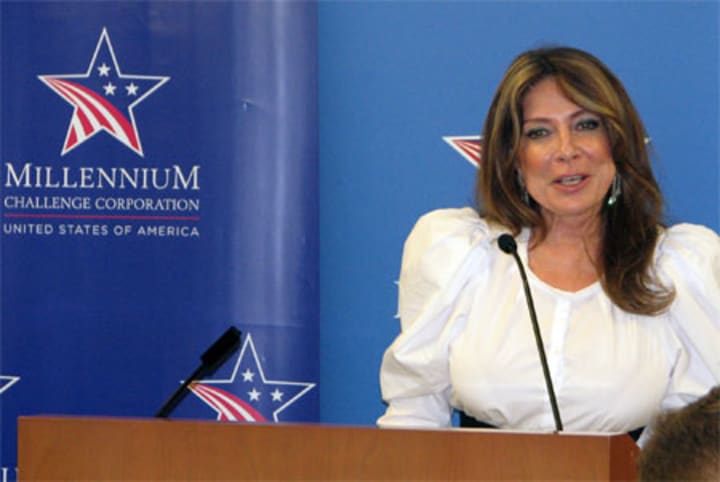
In just a few weeks, a new UNESCO leader will be crowned. The race for this plum diplomatic post is in full swing - and it is attracting a remarkable amount of attention.
Long-time front-runner Farouk Hosny, Egypt’s cultural minister, is facing a backlash after suggesting Israeli books in Egyptian libraries be burned; he later apologized for the comment. Other candidates are campaigning hard.
In a strong field, Ivonne A-Baki is emerging as the dark-horse candidate. The Ecuadorian politician and artist has put her presidency of the Andean Parliament on hold to run for the United Nations Educational, Scientific and Cultural Organization’s top job.
A-Baki’s career has many highlights: After graduating from Harvard University, she joined the board of directors of the Conflict Management Group, a nonprofit dedicated to promoting peace. She advised Ecuadorian President Jamil Mahuad during peace negotiations with Peru in late 1998, and became the country’s first woman ambassador to the United States the same year. A-Baki served for three years as Ecuador’s minister of trade, fisheries and competitiveness before being elected to the Andean Parliament in 2006.
A-Baki was born in Guayaquil, Ecuador, of Arab Lebanese parents, and lived in Lebanon for more than 18 years in the 1970s and ’80s with her husband and three children. A-Baki later shortened her last name, Abdel-Baki, to simplify pronunciation. Her paintings have been displayed in the Americas, Middle East and Europe. She has co-founded the Galapagos Conservancy Foundation to protect the archipelago of volcanic islands west of Ecuador.
During an Aug. 13 visit to Washington, A-Baki shared her vision for UNESCO and for developing the Andean region, Middle East and Africa.
What would you say are the biggest hurdles development faces in the Andean region?
Well, as always, it’s poverty, it’s lack of jobs, it’s lack of education - it’s the issues we all in our world are still asking. Whenever you see a person there, the only thing they are asking is, “Please, let me have a job. I want to feel included in society.” So, this is an issue that is really needed to be taken into consideration because, I think, as a human being, when you ask, what happens is they don’t tell you they want money or power: “We want to have a job so we get accepted.” - They want to be accepted in society. And I think we have to work to do this.
And I think a problem in the Andean region is we are creating this thing where politics is taking front stage instead of the people taking front stage. We are working very much on integration. Integration is not just a word - we have to understand our differences, we have to work together, we have to promote this culture of the Andes. Not only, “I’m from Ecuador” or Bolivia, or Peru, or Chile, or Venezuela - we have to feel we are from the Andes. We have to say: We are Andean. And that’s not happening yet, because of a lack of education and promotion.
International development assistance is often seen as money flowing from Europe or countries like the U.S. to poorer regions. What role should international and multilateral donors play in the development of the Andean region, and what role can your Latin American neighbors play?
Well, I think it’s important to have, of course, institutions helping the region. But I think we’re such a wealthy region. We are so rich in everything in our region that it’s not needed if it’s done in the right way, with the right governance, the right institutions … and a lack of corruption. I think corruption has created all these problems so that, instead of using our own resources to give to people, it’s happening that they’re always asking for help. And I think this dependence is not good. Even internally, when the government gives money to a person [just] because it likes helping that person, that’s not what the person needs. They need something more than just that.
And that’s why I think, because of the resources we have in our region, because of the richness of our region… If you speak about Ecuador, my country, we have oil - our first source of income. But we have an amazing variety of other resources. It’s a very fertile land so that whenever you are eating a fruit, you throw - and the next month you pass by, there is a tree. It’s just a rich place in every way. What it needs is to have the right approach, the right governance, stability … that the president stays longer. I think now President [Rafael] Correa has been elected for another term [and sworn in on Aug. 10, 2009], and people believe in him. Let’s hope that this will continue, because it will be very important for the stability in Ecuador for a president to finish his term. You know that in the past 10 years, we’ve had seven or eight presidents. So this is not something that the people would like, because they’re losing a lot.
So I think help from outside is important as long as it’s done in the right way, given to the right people for the right programs with the right results - accountability for what is invested. But, at the same time, we need to be on our own also trying to solve [problems] ourselves because we are a region that is very wealthy. And I’m not only talking about the Andes, I’m talking about the whole South America and Latin America. So, it’s good to work together, and I think the Americas as a whole, including the United States, should be thinking about this strengthening the Americas and doing something of unity like Europe did. And I think President Obama is in that line, too.
President Obama has stressed good governance. What are the dangers of tying development assistance closely to good governance and democratization initiatives?
It is, it is - you cannot untie them. Good governance and development and assistance, they can go hand in hand. It doesn’t mean you have to have this, or that, or one, or the other, or none - it has to be all together. They have to see it as an issue where you give assistance with good governance and this helps, and then, in the future, it becomes that you don’t need any more assistance.
You can do it like in Europe. When they started the European Union, Spain was less developed than the other countries. The assistance is still getting there. And look at Spain, how it has done! It’s better than the other countries that started the European Union. So it means that we have to have, in a way, an equality of development in the countries, so that there won’t be this disbalance. And the countries that are better off can help the less developed. And this is important to have because then you can open frontiers, and it won’t be a problem. It’s not that another country’s more developed, so people will go to that country to find jobs. If you develop your own, then it will be okay to stay, and they’ll be happy to be there.
So that’s what we have to think about. I was saying yesterday [Aug. 12], in a talk I was giving before coming, in Ecuador, that in this world that is so small, any country - whether it’s a neighbor country or a faraway country - that is not doing OK, we’re all not doing OK. It affects us all. So we have to really take this as a responsibility that every single country, whether small or big or powerful or not, it’s a part of our responsibility to give help where help is needed.
And I think that’s UNESCO’s role. UNESCO has to help in education, because with education, it’s the only way to get out of this poverty. And it’s poverty that’s the issue. It’s not violence… It’s not just the lack of war, it’s the lack of poverty! If you don’t educate people to get them out of poverty, this is going to continue forever. And this is what they’re having: more wars, more poverty, less education - in the 21st century!
So that’s why I’m really passionate about this new position - I hope I’ll get it! - because we can make so much in this moment in time.
Read more about Ivonne A-Baki’s vision for UNESCO, and her interest in conservation, in the second part of our interview with the Ecuadorian politician.




